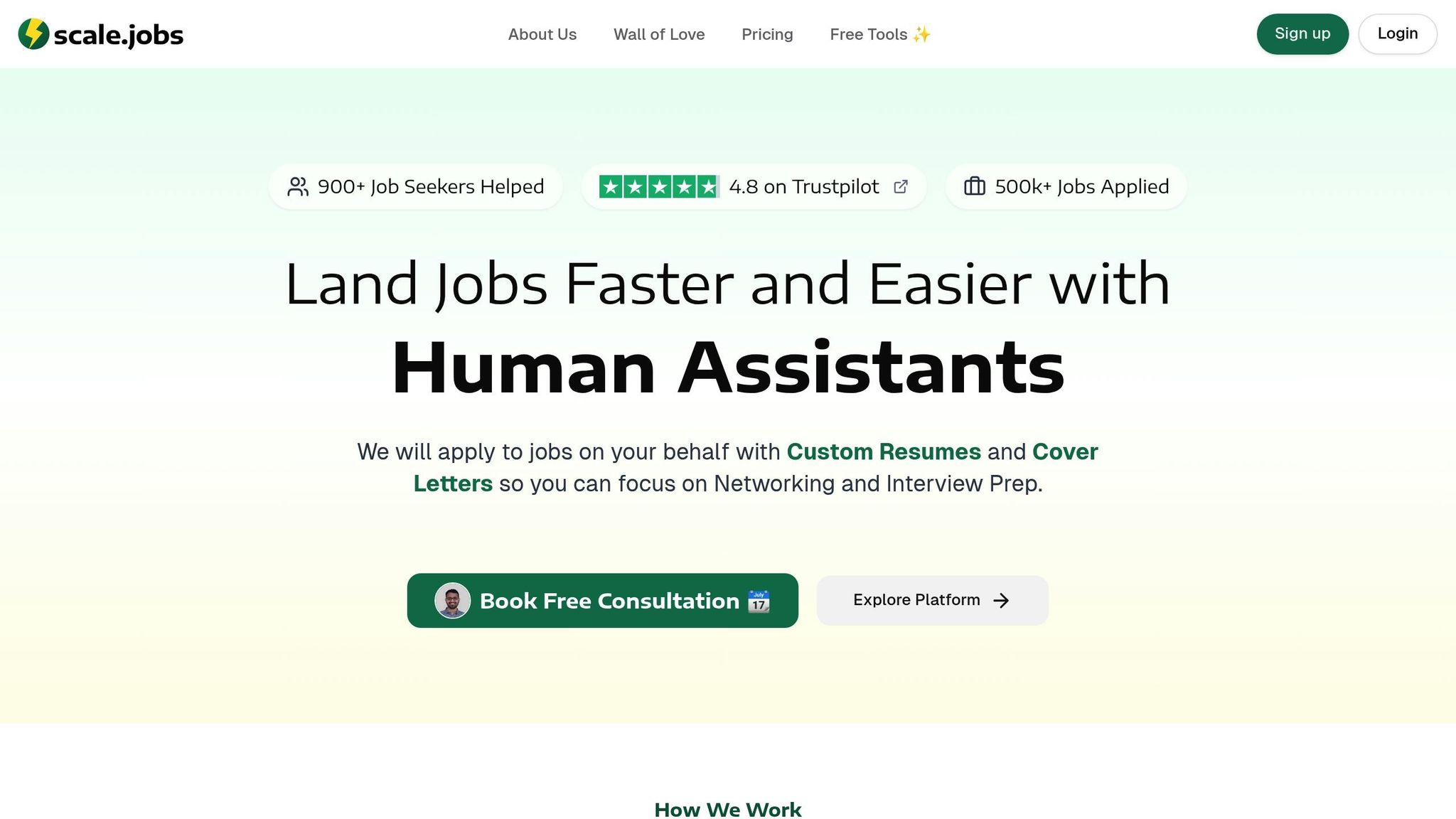Cybersecurity Risks in Job Application Systems
Online job applications pose significant cybersecurity risks. Learn how to protect your personal information and ensure secure hiring practices.

Online job applications are a goldmine for cybercriminals. They collect sensitive data like Social Security numbers, banking details, and employment histories - making them prime targets for identity theft, phishing scams, and database breaches.
Key risks include:
- Data breaches exposing personal information.
- Fake job scams tricking applicants into sharing sensitive data.
- Internal security gaps like weak data storage or excessive permissions.
How to protect yourself:
- Verify job postings before sharing personal details.
- Use strong passwords and enable two-factor authentication (2FA).
- Avoid sharing sensitive info (e.g., Social Security numbers) too early in the process.
- Secure your internet connection with a VPN when applying online.
For employers, prioritize end-to-end encryption, role-based access control, and staff security training to safeguard recruitment systems.
Staying alert and using secure platforms can significantly reduce these risks for both job seekers and employers.
Top 5 Cyber Security Risks for Businesses
Main Security Threats
Building on the risks mentioned earlier, let’s dive into specific threats that can compromise job application systems.
Digital job applications often have vulnerabilities that cybercriminals exploit. Both job seekers and employers need to understand these risks to safeguard sensitive information.
Personal Data Exposure
Job applications contain a wealth of personal information, making them attractive targets. Breaches in databases, applicant tracking systems (ATS), or cloud storage can expose this data. When compromised, personal details can be used for identity theft or other criminal purposes.
Fake Job Scams
Scammers use various tactics to exploit job seekers, including:
- Fake company websites and job postings: These impersonations trick applicants into sharing sensitive information.
- Malware-laden forms: Fraudulent forms may install harmful software on a user’s device.
- Phishing portals: Bogus platforms harvest login credentials and other personal data.
These scams can result in financial loss and jeopardize personal security. While external threats are a concern, internal vulnerabilities within organizations also pose risks.
Internal Security Risks
Organizations themselves can inadvertently create security gaps, such as:
- Excessive access permissions: Staff members may have unnecessary access to sensitive applicant data.
- Poor data storage practices: Application records may not be securely stored.
- Weak third-party integrations: Recruitment tools from external vendors can introduce security flaws.
Whether due to negligence or intentional misuse, internal issues can significantly undermine data security. To address these problems, companies should implement strong security protocols and invest in regular staff training.
Protection Tips for Job Seekers
Job seekers need to safeguard their personal information when applying online. Here’s a guide to help you stay secure during your job search.
Safe Application Practices
Before sharing sensitive details, take a moment to verify the company. Check their LinkedIn profile, official website, and contact information. Be cautious of job postings that seem suspicious or ask for upfront payments or banking details.
Watch out for these warning signs:
- Job offers without an interview
- Requests for your Social Security Number (SSN) before formal hiring
- Emails sent from personal accounts instead of company domains
- Entry-level roles offering unrealistically high salaries
Essential Security Measures
Follow these steps to protect your data:
-
Use Strong Passwords
- Create unique passwords for each job platform.
- Include a mix of numbers, symbols, and uppercase/lowercase letters.
- Aim for at least 12 characters.
-
Enable Two-Factor Authentication (2FA)
- Turn on 2FA for all job search accounts.
- Use authentication apps instead of relying on SMS codes.
- Store backup codes securely.
-
Secure Your Internet Connection
- Use a VPN when accessing public Wi-Fi.
- Keep your security software updated.
- Clear your browser cache, especially on shared or public devices.
Using Scale.jobs Safely

For a hassle-free and secure application process, consider platforms designed with data protection in mind.
Scale.jobs offers a secure way to manage your job applications. Their human virtual assistants handle the process while prioritizing data safety, so you can focus on preparing for interviews and networking.
"You should focus on what matters the most - Interview Prep - and let us handle the rest"
This approach works: 93% of Scale.jobs users secured full-time roles within three months.
Key security features include:
- Safe document handling
- Protected storage of personal information
- Screening of verified job postings
- Professional application management by human assistants
These features not only align with the security tips above but also cut job search time by an average of 40%.
Security Guide for Employers
Employers need to prioritize securing their application systems and candidate data against cyber threats. Protecting recruitment infrastructure is essential for meeting compliance standards and maintaining a strong reputation.
System Security Setup
Use a multi-layered security approach to safeguard systems effectively.
Key Infrastructure Steps:
- Use end-to-end encryption (E2EE) to secure all candidate data.
- Set up enterprise-grade firewalls with intrusion detection capabilities.
- Schedule automated vulnerability scans to identify weaknesses.
- Install anti-malware software across all recruitment systems.
- Ensure backups are protected with 256-bit AES encryption.
Access Control Practices:
- Implement role-based access control (RBAC) to limit permissions.
- Require strong passwords for all accounts.
- Enable multi-factor authentication (MFA) for HR personnel.
- Use single sign-on (SSO) for centralized and secure authentication.
- Log and monitor all system access attempts to detect unauthorized activity.
Data Protection Measures:
- Establish data retention policies aligned with GDPR.
- Automate data purging for unsuccessful applications.
- Use secure channels for uploading documents.
- Set clear protocols for safely sharing data between departments.
Once these systems are in place, ensure employees are trained to maintain and support these security measures.
Staff Security Training
Technology alone isn't enough - well-trained employees are your first line of defense against breaches. Proper training helps prevent human errors that could compromise security.
Core Training Topics:
- How to identify and avoid phishing attacks.
- Best practices for handling sensitive candidate information.
- Steps to follow during a security incident.
- Key compliance rules, including GDPR and CCPA.
- Effective password management strategies.
Simulated Drills and Reviews:
- Conduct regular phishing simulations to test awareness.
- Practice data breach response scenarios.
- Review security protocols every six months.
- Periodically evaluate staff knowledge with security assessments.
Documentation and Clear Procedures:
- Provide clear, accessible security guidelines for HR processes.
- Maintain incident response playbooks for quick action.
- Keep security training materials updated.
- Document all data handling workflows.
- Define clear escalation steps for security issues.
Ongoing Monitoring and Compliance:
- Perform regular compliance audits, review training effectiveness, and document all incident responses.
- Update security policies and procedures every quarter to address new threats.
New Security Tools
Job application platforms are now using technologies like artificial intelligence (AI) and blockchain to better protect recruitment data.
AI Security Systems
AI-powered security tools are being added to recruitment platforms to improve how they detect and handle threats. These systems monitor user behavior, flag unusual activities, and adjust defenses automatically to guard against cyber risks. Meanwhile, blockchain technology provides a decentralized method to secure sensitive information.
Blockchain Data Protection
Blockchain secures candidate data by creating tamper-proof records and encrypting storage. It also allows for selective sharing of credentials, ensuring better control and privacy over personal information.
These technologies are paving the way for a safer recruitment process, helping both job seekers and employers keep sensitive data secure.
Conclusion
Cyber threats are constantly changing, making it crucial to protect your data during job applications. The use of tools like AI monitoring and blockchain technology highlights efforts to keep sensitive information secure.
Main Points
Here are some practical steps to safeguard your information:
- Protect Your Data: Create strong, unique passwords, enable two-factor authentication (2FA), and keep your security software up to date.
- Verify Before Sharing: Check job postings and recruitment platforms carefully. Make sure websites use secure, encrypted connections before entering personal information.
- Use Secure Platforms: Platforms like Scale.jobs offer encrypted data transmission and secure storage, ensuring your personal details remain private throughout the application process.
- Stay Alert: Regularly monitor your application accounts for unusual activity and keep your security settings updated across all platforms.
The future of secure job applications depends on both advanced technology and smart user habits. By staying cautious and choosing secure platforms, job seekers and employers can protect sensitive information and ensure a safer recruitment process.
Ultimately, cybersecurity in job applications isn't just about tools - it's about fostering a proactive mindset to guard personal data.




